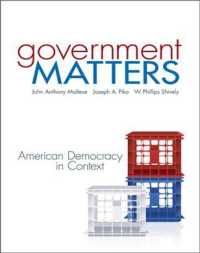- ホーム
- > 洋書
- > 英文書
- > Politics / International Relations
Full Description
This book assesses the extent to which two specialized UN agencies - the International Maritime Organization (IMO) in London and the International Civil Aviation Organization (ICAO) in Montreal - have been able to regulate environmental pollution in the global commons.
Since the Kyoto Protocol and its tasking of these two public International Organizations (IOs) in 1997 to regulate greenhouse gas emissions from the fast-growing international shipping and aviation sectors, they have struggled with the assignment even as the external pressure has mounted for them to act. David Deese examines why these two UN agencies have largely failed to execute their critical missions to date and explores the most promising emerging and feasible routes to control and reduce these emissions by other means. Drawing on a range of sources including interviews with key actors in the IMO and ICAO, as well as from industry and national governments, Deese looks at the multifaceted politics that drive these IOs and considers how this has delayed and frustrated the execution of their assigned climate mitigation missions. He also explains how the limitations of the IMO and ICAO are likely to be found to a degree in other UN specialized agencies and examines how lessons learned here will be helpful in understanding the operations of other IOs.
The book will be of great interest to students and scholars of global governance and IOs, transport, and environment and climate change. It will also be a useful resource for industry and non-profit experts and public officials working in shipping and aviation regulation.
Contents
Contents
1. Introduction
2. The Literature and Analytical Framework
3. Earlier Environmental Regulation by the IMO
4. Local Air Quality Standards: A Partial ICAO Regulatory Success
5. The Largely Failed IMO Efforts to Regulate Greenhouse Gas Emissions
6. The Modest ICAO Measures Mitigating Greenhouse Gas Emissions
7. What Explains these Largely Failed ICAO and IMO Efforts to Date?
IO identity, behavior, design
Industry
Political leadership
Great power domination
8. The Most Promising Alternative Pathways to Net Zero 2050
International Agency Initiatives and Innovation
Regional and Bilateral Governments' Latest Steps and Actions
Civil Society: Non-Profit Initiatives & Campaigns
Industry and Company Initiatives
Individuals as Consumers, Voters, and Influencers
9. Conclusion
Index








